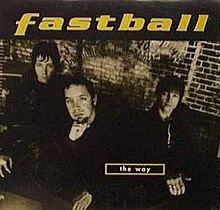The Way (Fastball song)
| "The Way" | ||||
|---|---|---|---|---|
 |
||||
| Single by Fastball | ||||
| from the album All the Pain Money Can Buy | ||||
| Released | February 24, 1998 | |||
| Format | CD single, cassette single | |||
| Genre | Alternative rock | |||
| Length | 4:17 (Album Version) 4:08 (Radio Edit) |
|||
| Label | Hollywood | |||
| Writer(s) | Tony Scalzo | |||
| Fastball singles chronology | ||||
|
||||
"The Way" is a song by the American alternative rock band Fastball. It was released in February 1998 as the lead single from their second studio album, All the Pain Money Can Buy.
It peaked at number-one on the U.S. Billboard Modern Rock Tracks chart in April and remained there for seven weeks. The song also reached number-one on Canada's Singles Chart. It peaked at number 21 on the UK Singles Chart, having had a fair amount of airplay from independent radio stations such as Forth One.
The song was voted by VH1 as one of the 100 Greatest Songs of the 1990s, ranking at number 94. The song was remixed about a year after its original release by Italian DJ Gigi D'Agostino, in his album L'Amour Toujours. Alvin and the Chipmunks covered the song for their 2007 video game Alvin and the Chipmunks.
Fastball front man Tony Scalzo came up with the idea for the song after reading journalistic articles which described the disappearance of an elderly married couple, Lela and Raymond Howard from Salado, Texas, who left home in June 1997 to attend the Pioneer Day festival at nearby Temple, Texas, despite Lela's Alzheimers and Raymond recently recovering from brain surgery. They were discovered two weeks later, dead, at the bottom of a ravine near Hot Springs, Arkansas, hundreds of miles off their intended route.
About the song, Scalzo said that "It's a romanticized take on what happened" - he "pictured them taking off to have fun, like they did when they first met."
The song's lyrics revolve around an older married couple who decide to leave their life behind by packing their things and going driving, without telling their children about their plans. Their car breaks down during the trip, forcing them to continue on foot. The chorus expresses the idea that the couple are achieving happiness by losing touch with the world, even though they may never see their home again.
...
Wikipedia
